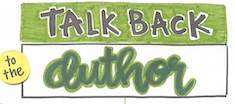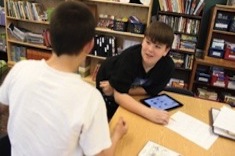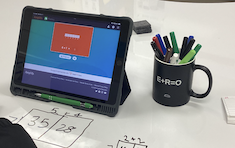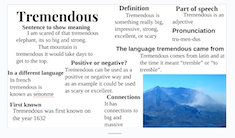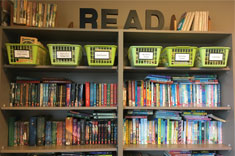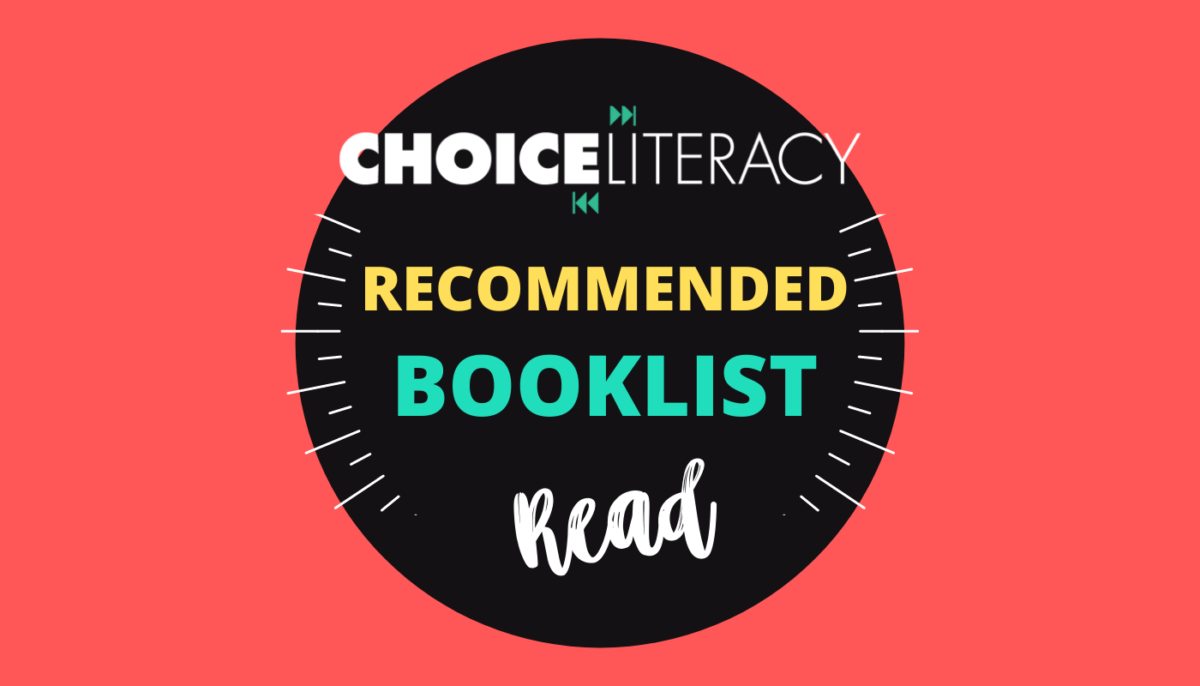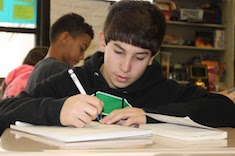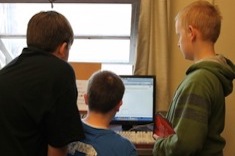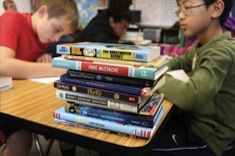8th
Latest Content
Background Knowledge: More than Just Facts
Although background knowledge may feel like an “old concept,” Leigh Anne Eck offers fresh and important considerations to lift students’ ability to comprehend complex texts.
Talking Back: A Strategy for Annotation
Tiffany Abbott Fuller gives us everything we need to use an active reading strategy. By the time you finish reading this article, you’ll be prepared to teach this strategy, equipped with sentence stems for students, specific ideas for instruction, and an anchor chart for visual reference.
Can AI Help with Assessment?
Tara Barnett and Kate Mills explore using AI to help with grading student writing. In this practical and insightful article, they share a process for using AI as a co-teacher and their reflection on whether it helped them save time (nope) and made their feedback more useful (yep). They share a downloadable student literary essay reflection sheet that you might want to use in your classroom, too.
Vertical Conversations to Create Coherence
Jodie Bailey shows how representations and models help students understand complex math concepts. By participating in vertical conversations, teachers can strengthen our own understandings of skill progressions and help students develop essential connections and deeper understandings.
Harnessing the Power of Words
Tara Barnett and Kate Mills share three quick ways to increase vocabulary exposure in middle school. They also offer a summary of the importance of vocabulary development that inspires the urgency of vocabulary instruction.
Writing to Learn
Leigh Anne Eck shares how her middle school moved away from essay writing in all content areas and prioritized three writing strategies: sentences, summaries, and quick-writes as low-stakes writing tasks.
Writing About Reading: A Search for Authenticity
In this powerful essay, Leigh Anne Eck challenged herself to read a complex text and discover the authenticity of writing about reading. She transferred her experience to create meaningful opportunities for her students as they write about their own independent reading.
Alternatives to a Literary Essay: Two-Voice Perspective Poems
Tara Barnett and Kate Mills offer an alternative to writing a literary essay for middle school students. Providing alternative ways to discuss and demonstrate understanding about reading can be a welcome break from an essay for both students and educators, with valuable learning still taking place.
Delving Deeper Through Inquiry-Based Learning
Jodie Bailey suggests using books, pictures, or examples to begin or increase inquiry-based learning in your classroom. Using an example of learning more about pi from her classroom, Jodie offers ways to help students deepen their learning in any content area.
Girls’ Sports Books
Leigh Anne Eck noticed a gap in her library when it came to books with athletic female protagonists. After discovering many titles to add to her own library, Leigh Anne compiled this booklist so we can all fill this gap in our classroom libraries.
Literacy Skills in All Content Areas
Julie Cox reminds us that each content area is full of opportunities for students to give shape to their ideas in all kinds of ways that don’t look like traditional essays but still help them develop their literacy skills.
Love Poetry: Take It or Leave It, but Tell Me Why
In today’s world we are bombarded with opinions that are increasingly polarizing, and this is especially true for teens and their opinions of love poems. Gretchen Schroeder uses love poems to help students learn how to back up an opinion with criteria, details, and examples.
Considerations for AI in the Classroom
Julie Cox wrestles with the use of AI to support high school writers. In this article she offers filters for educators to determine the role of AI in their classrooms.
Literary Salons: Book Clubs, Elevated
Inspired by the 17th-century popularity of literary salons, Gretchen Schroeder changed the usual book club routine for her high school students. Literary salons allow people to explore big topics and ideas together without reading the same book. They can create engaging discussions, expose students to new ideas and books, and give them the chance to learn from one another in a relaxed way.
How to Promote Civil Discourse in Your Classroom
Matt Renwick shows how to build the capacity of all students to engage in civil discourse.
Navigating the Election Season Booklist
Mandy Robek shares a booklist inspired to give students background about U.S. presidential elections.
Putting Political Talk into Perspective
Gretchen Schroeder encourages teachers to help students know how to talk politics by establishing a positive mindset and attitude when approaching conversations.
A Poetic Beginning
Tara Barnett and Kate Mills use poetry to help students discover writing ideas. Inspired by three poems, students share their notebook entries and poems from the first days of a new school year.
Let’s Begin
Gwen Blumberg reflects on the community developed at a writing retreat and encourages teachers to consider the community of learners they will intentionally nourish this school year.
Fluency Practice in Middle School
Leigh Anne Eck tackles fluency strategies with her middle school readers.
Purposeful Play
Jodie Bailey makes a case for purposeful play with her middle school students. To strengthen reading habits, we offer exposure to a wide variety of books, time to read, and opportunities to discuss ideas. In math classrooms, students need similar opportunities to explore and play.
Your Voice Matters
Jodie Bailey shares a picture-book version of Martin Luther King Jr.’s I Have a Dream speech and then gives students time to reflect on the message. While math class might seem like an unusual place to help students consider their identity and place in the world, Jodie inspires teachers to offer space and time for students to find their voice…while making direct connections to math standards.
Examining Power Dynamics
Gretchen Schroeder leads her students to consider the power and privilege in the texts they read. By creating a power continuum, students become more aware of issues of power and oppression in society. Once this happens, they can move to discussions of how to take action for positive social change.
Building Vocabulary One Purple Word at a Time
Leigh Anne Eck shares one way to uplift word choice of middle school writers. Through a simple and responsive system, her students are growing their vocabulary, learning parts of speech, and taking risks with more sophisticated word choice. All you need is a purple highlighter and a willingness to celebrate student voices.
Empowering Students Through Thinking Routines
Jodie Bailey shares practical ways to nourish students’ thinking routines in her math classroom. She is inspired by Peter Liljedahl’s book Building Thinking Classrooms.
Using Drama Games to Approach Difficult Conversations
Gretchen Schroeder is committed to having conversations about race and racism with her high school students. Sometimes it’s difficult to engage students, so Gretchen used drama games as a means to think about concepts metaphorically, then ground them within the text, and, finally, have students apply them to their own lives and the world.
When Reading Practices Drift
When Leigh Anne Eck noticed her students’ reading practices weren’t as robust as she expected, she realized she was the one who had drifted away from key instructional practices. Leigh Anne offers several ways to support students in their independent reading lives.
Kintsugi
Given an assignment to break a china bowl and rebuild it allowed Gretchen Schroeder to engage in the Japanese art of kintsugi. What surprised her were the lessons she learned about growth and innovation in her teaching practice.
Sparking Curiosity: Developing Ownership of Learning Through “What If” Questions
Jodie Bailey encourages us to use “What if” questions in all content areas to give students the space to use their innate curiosity to engage in meaningful learning.
Detours: A Reminder of the Humanity of Students
Gretchen Schroeder reminds us of the importance of checking in with students and gauging how they are feeling—and then responding with authenticity and joy.
Browse Content By
Type
Category
- Assessment Tools
- Big Fresh Archives
- Booklists
- Choice Numeracy
- Classroom Design
- Common Core
- Community Building
- Conferring
- Content Literacy
- Digital Literacy
- English Language Learners
- Equity
- Family Relations
- Free Samples
- Guiding Groups
- Leadership
- Literacy Coaches
- Mentor Texts
- Minilessons
- New Teacher Mentors
- Podcasts
- Poetry
- Quote Collections
- Reading Strategies
- Self Care
- Struggling and Striving Learners
- Talking and Listening
- Teacher Study Groups
- Teaching Reading
- Teaching Writing
- Word Study and Vocabulary
Author
- Melissa Quimby
- Nawal Qarooni
- Gwen Blumberg
- Julie Cox
- The Lead Learners
- Hannah Tills
- Josie Stewart
- Ruth Metcalfe
- Mallory Messenger
- Becca Burk
- Jodie Bailey
- Vivian Chen
- Mary Brower
- Tiffany Abbott Fuller
- Stephanie Affinito
- Ruth Ayres
- Leigh Anne Eck
- Heather Fisher
- Shari Frost
- Julie Johnson
- Suzy Kaback
- Gigi McAllister
- Shirl McPhillips
- Melanie Meehan
- Cathy Mere
- Debbie Miller
- Tara Barnett and Kate Mills
- Tammy Mulligan
- Dana Murphy
- Bitsy Parks
- David Pittman
- Brenda Power
- Heather Rader
- Matt Renwick
- Mandy Robek
- Christy Rush-Levine
- Gretchen Schroeder
- Jen Schwanke
- Brian Sepe
- Katherine Sokolowski
- Stella Villalba
- Jennifer Vincent
Grade Level
Choice Literacy Membership
Articles
Get full access to all Choice Literacy article content
Videos
Get full access to all Choice Literacy video content
Courses
Access Choice Literacy course curriculum and training


